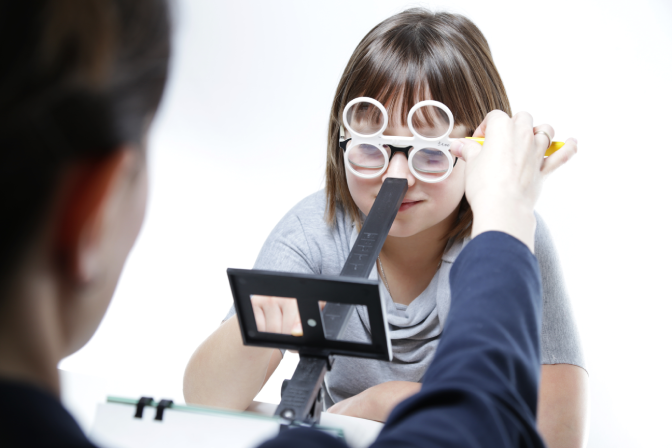50% OFF a Complete Pair of Glasses
*Restrictions apply. Click here for details.
Vision Therapy Clarkson Eyecare
Vision Therapy From Clarkson Eyecare

Clarkson Eyecare is staffed with highly trained doctors and specialists to help adults and children improve their vision. Our vision therapy provider at at our Riverview, OH office, Dr. Steven Curtis takes a special interest in pediatric optometry, vision therapy, and sports vision enhancement. Our doctor is board-certified and strives to provide the best care for their patients by continuing to be on the cutting edge of new technology.
Find a Clarkson Eyecare Vision Therapy Center Near You

Clarkson Eyecare has an eye doctor in the Columbus, Ohio area who provides vision therapy services.
What is Vision Therapy?
Vision therapy is conducted by optometrists and aims at improving and strengthening visual skills to help the eyes work more effectively and efficiently. Vision therapy uses a variety of exercises to not necessarily improve your eyesight, but more so to improve visual skills like focusing, eye-tracking, hand-eye coordination, visual processing, convergence, and more. Therapy is structured as a performance enhancement program focusing on children and adults of any age or developmental stage. A vision therapy program typically consists of supervised exercises performed over weeks or months. In addition to exercises, lenses, prisms, filters, patches, computer programs, sensory integration techniques, electronic targets, or balance boards may be used.
Signs Vision Therapy Can Be Beneficial
Common signs and symptoms people experience that could be improved by vision therapy included, trouble focusing, headaches, poor hand-eye coordination, squinting, blurry vision, eye strain, dizziness, and covering one eye. If you have suffered a brain injury, vision therapy is used as a part of neuro-optometric rehabilitation services. This applies to concussion, stroke, birth trauma (ADD/ADHD), chemical trauma (chemotherapy), physical trauma, in-utero trauma (CP, FAS) or other forms of trauma or disorder, Individuals who wear glasses or contact lenses can also benefit from vision therapy as it helps improve vision skills while the glasses and contact work to improve the clarity of vision.
Vision Therapy for Children
Vision therapy can be very beneficial for children who have learning difficulty, poor reading skills, trouble with hand-eye coordination, a lazy eye, and more. Some learning difficulties may stem from vision problems like convergence insufficiency which can cause poor focusing ability on an object close to them, like a book or tablet.
Common Vision Therapy Exercises
Clarkson Eyecare offers three types of vision therapy: Developmental Vision Therapy, Neuro-Optometric Rehabilitation, and Sports Vision Training and our highly trained vision therapy team utilizes specialized equipment throughout the program such as:
Corrective and Therapeutic Lenses
Prism Lenses
Filters
Rotational Trainer
Right Eye and Right Eye EyeQ Reports — This device measures the accuracy and speed of eye alignment during reading, sports performance and gives a detailed report of the areas that may need treatment.
Sanet Vision Integrator (SVI) and Wii Balance Board — This instrument enhances visual tracking speed and accuracy.
Computer Orthoptics VTS4 — This technology measures and treats lazy eye, eye turn, eye-teaming, and eye-alignment issues.
Vectograms
Optics Trainer Eye Tracking Program
Meet Steven Curtis, O.D., FCOVD, FNORA

Dr. Steven J. Curtis, a native of Marietta, Ohio, received his Doctor of Optometry degree from The Ohio State University in 1987. Dr. Curtis is a member of the American Optometric Association and the Ohio Optometric Association. He is also a member of the College of Vision Development, The Optometric Extension Program, The Sports Section of the AOA, and The Ohio Amblyope Registry.
Dr. Curtis was awarded the “Optometrist of the Year” by Novamed Alliance in 2005. He was also selected as one of Consumer Reports Top 100 Optometrists in 2003. Dr. Curtis has earned fellowship certification from the College of Optometrists in Vision Development and the Neuro-Optometric Rehabilitation Association.
Dr. Curtis enjoys the growth in his work with patients who suffer persistent vision disturbances after brain injury including concussion and stroke. He has worked with many athletes including some from the Columbus Crew and Columbus Blue Jackets.
Schedule an Appointment Today to Begin Vision Therapy

If you or your child lacks the necessary visual skills for reading, writing and learning (i.e. eye movement and focusing skills, convergence, eye-hand coordination, visual memory skills, etc.) then vision therapy might be beneficial for you. Call us today to schedule an appointment. Our eye doctors will conduct a comprehensive eye exam to help identify issues and determine the best exercises and treatment for vision therapy.
Frequently Asked Questions About Vision Therapy
Optometric vision therapy can be very beneficial for children who have learning difficulty, poor reading skills, trouble with hand-eye coordination, a lazy eye, and more. Some learning difficulties may stem from vision problems like convergence insufficiency which can cause poor focusing ability on an object close to them, like a book or tablet.
Just like any therapy, it is a weekly in-office treatment program with additional at-home therapy. Every person is different, and the amount of time therapy is needed differs. Improvements and results can be noticed in just a few weeks or up to a few months.
Vision therapy is beneficial for both adults and children who might have trouble focusing, poor hand-eye coordination, and other vision issues such as:
Problems with reading
Focusing problems (accommodative issues)
Crossed Eye/Eye Turn (Strabismus) or Lazy Eye (Amblyopia)
Binocular vision issues (problems with the eyes working together or teaming)
Convergence Insufficiency (eye alignment issue up close)
Traumatic Brain Injury including Concussions
Computer-induced or Stress-induced vision problems
Visual Perception Disorders
Visual-Motor Disorders
Vision therapy consists of various exercises that help improve the connection and communication between your brain and your eyes. A vision therapy program consists of supervised exercises performed over weeks to months. In addition to exercises, lenses, prisms, filters, patches, computer programs, sensory integration techniques, electronic targets, or balance boards may be used. Vision therapy helps improve your eyes’ efficiency and your performance in life activities including school work, sports, driving, balance, and more.
